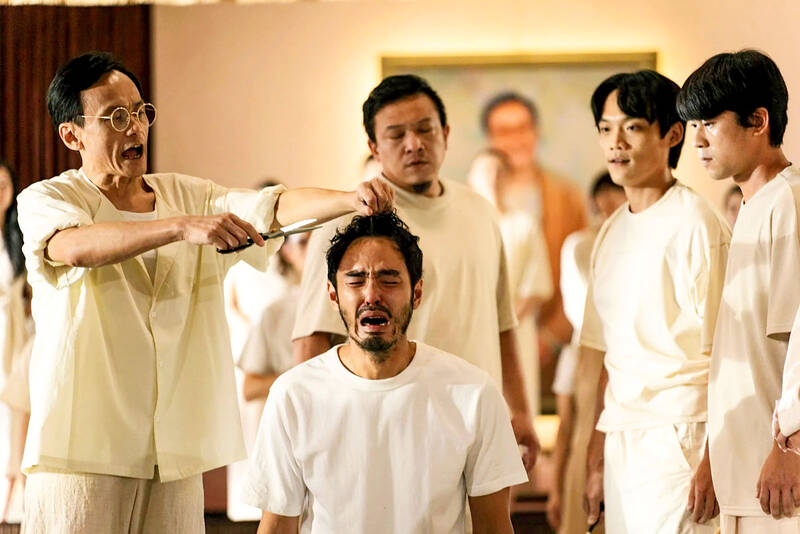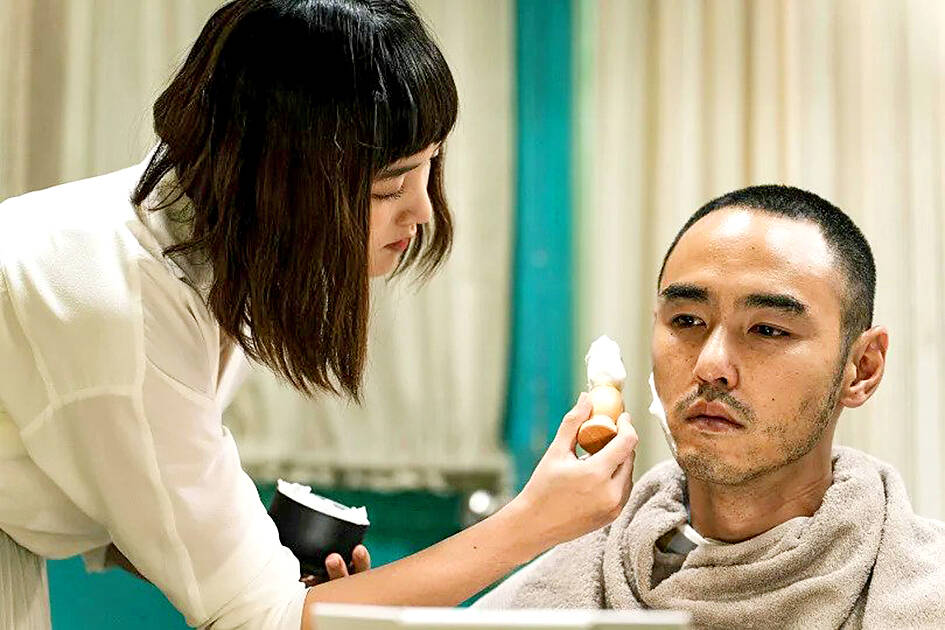Taiwanese cinema’s fascination with gangsters and senseless violence continues with The Pig, The Snake and The Pigeon (周處處三害), inspired by the fifth-century Chinese fable Zhou Chu Eradicates the Three Scourges. This one is a bit different, however, as it minimizes the brotherhood element for a darker tale of a desperate fugitive who will do almost anything to leave his mark on history.
Although there are clear parallels, the folk tale has a very different moral message. Prompted by a villager, local hoodlum Zhou Chu sets out to rid his town of the three evil beings who have been terrorizing the area. After dispatching a vicious tiger, he spends three days battling a dragon. When he prevails and returns, he sees the villagers celebrating as they thought he had died with the dragon. Zhou soon realizes he is the third scourge and decides to change his ways, becoming an upright man of integrity. Eventually he becomes a beloved general who dies on the battlefield.
Protagonist Chen Gui-lin (Ethan Juan, 阮經天), on the other hand, has no such noble intentions. In hiding after committing a series of brazen assassinations of rival gang bosses, he decides (through throwing divination blocks) to turn himself in after learning that his grandmother has died and that he has stage four lung cancer. At the police station, however, he realizes he is just number three on the most wanted list. Wanting to go out in a blaze of glory, and having nothing more to lose with his grandmother gone, he vows to take the top two criminals out first so he can claim the top spot.

Photo courtesy of An Attitude Production Co
“I’m not afraid of death,” he says in one scene. “I’m afraid that people don’t know my name!”
But instead of going on an all-out rampage, the rest of the movie portrays Gui-lin a sympathetic character, despite his shallow motives and violent behavior. His two targets, Hongkie and Lin Lu-he, are convincingly portrayed by Ben Yuen (袁富華) and Chen Yi-wen (陳以文) as depraved, sinister scumbags, making Gui-lin seem almost angelic in comparison as he inadvertently saves others from their tyranny.
Despite his simplemindedness and trigger-happy tendencies, Gui-lin still has somewhat of a conscience, making one want to know more about his backstory; however that isn’t flushed out at all. Instead, too much is focused on unconvincing heart-rending scenes that merely prove that he has a conscience.

Photo courtesy of An Attitude Production Co
These more tender moments are provided by the three characters who interact personally with Gui-lin — the detective on his trail (Lee Lee-zen, 李李仁), his underworld doctor (Cherry Hsieh, 謝瓊煖) and the girl he saves (Gingle Wang, 王淨) — but they’re simply not featured enough to provide enough emotional weight. Still, it’s a compelling character study, and Juan does a great job toeing the line between tragic hero and impulsive madman.
The film is made more entertaining with absurdist elements that soften the violence, though often to the point that many of the scenes are simply not very believable. There are also some interesting twists and symbolism about redemption and rebirth that provide depth to the narrative. It surely has its flaws, but The Pig, The Snake and The Pigeon is still an intriguing take on the gangster genre that smartly avoids relying too much on action scenes to maintain its intensity.

Photo courtesy of An Attitude Production Co

In the March 9 edition of the Taipei Times a piece by Ninon Godefroy ran with the headine “The quiet, gentle rhythm of Taiwan.” It started with the line “Taiwan is a small, humble place. There is no Eiffel Tower, no pyramids — no singular attraction that draws the world’s attention.” I laughed out loud at that. This was out of no disrespect for the author or the piece, which made some interesting analogies and good points about how both Din Tai Fung’s and Taiwan Semiconductor Manufacturing Co’s (TSMC, 台積電) meticulous attention to detail and quality are not quite up to

April 21 to April 27 Hsieh Er’s (謝娥) political fortunes were rising fast after she got out of jail and joined the Chinese Nationalist Party (KMT) in December 1945. Not only did she hold key positions in various committees, she was elected the only woman on the Taipei City Council and headed to Nanjing in 1946 as the sole Taiwanese female representative to the National Constituent Assembly. With the support of first lady Soong May-ling (宋美齡), she started the Taipei Women’s Association and Taiwan Provincial Women’s Association, where she

Chinese Nationalist Party (KMT) Chairman Eric Chu (朱立倫) hatched a bold plan to charge forward and seize the initiative when he held a protest in front of the Taipei City Prosecutors’ Office. Though risky, because illegal, its success would help tackle at least six problems facing both himself and the KMT. What he did not see coming was Taipei Mayor Chiang Wan-an (將萬安) tripping him up out of the gate. In spite of Chu being the most consequential and successful KMT chairman since the early 2010s — arguably saving the party from financial ruin and restoring its electoral viability —

It is one of the more remarkable facts of Taiwan history that it was never occupied or claimed by any of the numerous kingdoms of southern China — Han or otherwise — that lay just across the water from it. None of their brilliant ministers ever discovered that Taiwan was a “core interest” of the state whose annexation was “inevitable.” As Paul Kua notes in an excellent monograph laying out how the Portuguese gave Taiwan the name “Formosa,” the first Europeans to express an interest in occupying Taiwan were the Spanish. Tonio Andrade in his seminal work, How Taiwan Became Chinese,